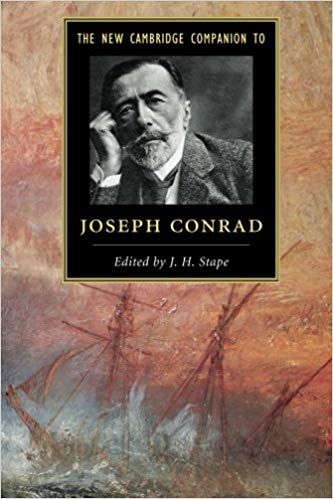tutorial, commentary, study resources, plot, and web links
The Informer was written before January 1906 and first published in December 1906, in Harper’s Magazine. It was later collected in A Set of Six, 1908 (UK), 1915 (US). The other stories in this collection of Joseph Conrad’s work are Gaspar Ruiz, An Anarchist, The Brute, The Duel, and Il Conde.
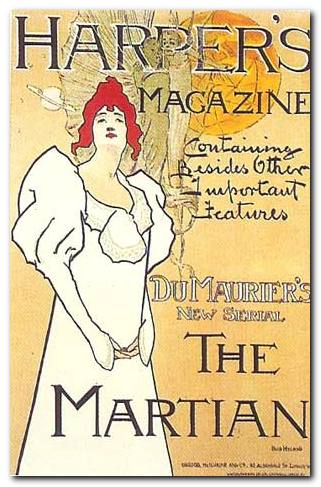
The Informer – critical commentary
Conrad took an active and well-informed interest in relations between anarchist or revolutionary movements (which at the time were thought to be one and the same thing) and the upper echelons of the very society they were supposed to be in the process of overthrowing.
This was a phenomenon he explored more thoroughly in both The Secret Agent (1907) and Under WesternEyes (1911). There he shows complex relationships and often contradictory policies between police and government officials in their dealings with anarchists – and certainly rivalries between foreign agencies.
The Informer encapsulates all these elements in one short tale. The anarchists are exploiting the sympathies of the upper-class young woman. She owns the house because her father is a rich government official – and he works in an office in the house next door.
The anarchists hide behind a veneer of respectability (which they are supposed to despise) and even carry on clandestine business activities in imitation of the bourgeoisie they theoretically wish to overthrow. They also have an informer, Severin, planted firmly within their midst.
But the major character study in political contradictions is Mr X himself – a man who operates at the highest levels of political activism: it is he who has been sent from Paris to investigate the possibility of a spy in the group. But in fact he is mainly taken up with the pursuit of everything that is a product of cultural refinement in bourgeois society – its artefacts, cuisine, and fine wines. He is very technically an anarchist in a very theoretical sense, but in fact all the values and the culture to which he devotes himself are the product of the leisured bourgeois class.
Conrad is fully aware of this glaring contradiction, and it is this which forms the principal interest in the tale. That is the reason that Mr X has been sent to the narrator as an example of a ‘collector’s item’ by his friend in Paris.
The Informer – study resources
![]() A Set of Six – CreateSpace editions – Amazon UK
A Set of Six – CreateSpace editions – Amazon UK
![]() A Set of Six – CreateSpace editions – Amazon US
A Set of Six – CreateSpace editions – Amazon US
![]() The Complete Works of Joseph Conrad – Kindle eBook
The Complete Works of Joseph Conrad – Kindle eBook
![]() A Set of Six – eBook versions at Project Gutenberg
A Set of Six – eBook versions at Project Gutenberg
![]() Joseph Conrad: A Biography – Amazon UK
Joseph Conrad: A Biography – Amazon UK
![]() The Cambridge Companion to Joseph Conrad – Amazon UK
The Cambridge Companion to Joseph Conrad – Amazon UK
![]() Routledge Guide to Joseph Conrad – Amazon UK
Routledge Guide to Joseph Conrad – Amazon UK
![]() Oxford Reader’s Companion to Conrad – Amazon UK
Oxford Reader’s Companion to Conrad – Amazon UK
![]() Notes on Life and Letters – Amazon UK
Notes on Life and Letters – Amazon UK
![]() Joseph Conrad – biographical notes
Joseph Conrad – biographical notes
The Informer – plot summary
The un-named English narrator, a collector of antiques, is visited, on the recommendation of a friend in Paris, by Mr X – a fellow collector, an anarchist, and a bon viveur. Mr X explains the complicity between anarchists and certain elements of the classes they wish to overthrow. He describes the Hermione Street anarchist headquarters in London set up in the house of a young middle-class woman supporter. The group take over the ground floor restaurant, establish a business exporting tinned soup on the top floor, and set up a printing press in the basement. But despite good organisation, all the actions planned there are foiled by the police. Mr X arrives from Paris to investigate the possibility of there being an informer in the group. He interviews the Lady Amateur patroness of the group, and meets her admirer Severin.
A plan emerges to blow up the building next door which houses a government department. Mr X is sure that the police will raid the Hermione Street headquarters, so he organises a fake raid by sham police, hoping to flush out the informer. When the bogus raid takes place the group are ‘arrested’ in the cellar, and then are joined by the Lady Amateur and her lover. Severin gives himself away to the fake inspector by trying to protect her, and when his mistake is exposed he takes poison and dies. Mr X then takes the Lady Amateur home.
Joseph Conrad – video biography
The Informer – principal characters
| — | an un-named English narrator – collector of antiques |
| Mr X | an anarchist, antiques collector, writer, and bon viveur |
| — | the Lady Amateur – a middle class woman anarchist sympathiser |
| Severin | her lover, the informer |
| Horne | an artist, engraver, and anarchist |
Joseph Conrad’s writing
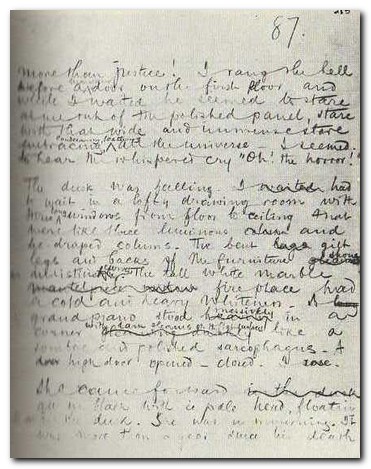
Manuscript page from Heart of Darkness
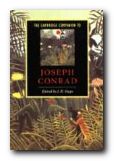 The Cambridge Companion to Joseph Conrad offers a series of essays by leading Conrad scholars aimed at both students and the general reader. There’s a chronology and overview of Conrad’s life, then chapters that explore significant issues in his major writings, and deal in depth with individual works. These are followed by discussions of the special nature of Conrad’s narrative techniques, his complex relationships with late-Victorian imperialism and with literary Modernism, and his influence on other writers and artists. Each essay provides guidance to further reading, and a concluding chapter surveys the body of Conrad criticism.
The Cambridge Companion to Joseph Conrad offers a series of essays by leading Conrad scholars aimed at both students and the general reader. There’s a chronology and overview of Conrad’s life, then chapters that explore significant issues in his major writings, and deal in depth with individual works. These are followed by discussions of the special nature of Conrad’s narrative techniques, his complex relationships with late-Victorian imperialism and with literary Modernism, and his influence on other writers and artists. Each essay provides guidance to further reading, and a concluding chapter surveys the body of Conrad criticism.
![]() Buy the book at Amazon UK
Buy the book at Amazon UK
![]() Buy the book at Amazon US
Buy the book at Amazon US
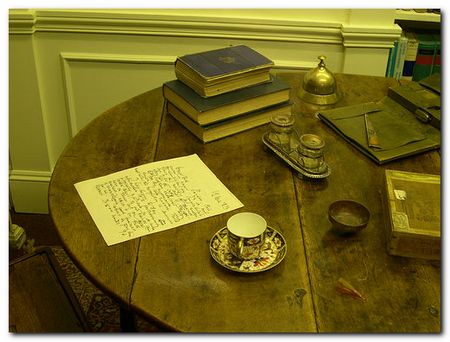
Joseph Conrad’s writing table
Further reading
![]() Amar Acheraiou Joseph Conrad and the Reader, London: Macmillan, 2009.
Amar Acheraiou Joseph Conrad and the Reader, London: Macmillan, 2009.
![]() Jacques Berthoud, Joseph Conrad: The Major Phase, Cambridge: Cambridge University Press, 1978.
Jacques Berthoud, Joseph Conrad: The Major Phase, Cambridge: Cambridge University Press, 1978.
![]() Muriel Bradbrook, Joseph Conrad: Poland’s English Genius, Cambridge: Cambridge University Press, 1941
Muriel Bradbrook, Joseph Conrad: Poland’s English Genius, Cambridge: Cambridge University Press, 1941
![]() Harold Bloom (ed), Joseph Conrad (Bloom’s Modern Critical Views, New York: Chelsea House Publishers, 2010
Harold Bloom (ed), Joseph Conrad (Bloom’s Modern Critical Views, New York: Chelsea House Publishers, 2010
![]() Hillel M. Daleski , Joseph Conrad: The Way of Dispossession, London: Faber, 1977
Hillel M. Daleski , Joseph Conrad: The Way of Dispossession, London: Faber, 1977
![]() Daphna Erdinast-Vulcan, Joseph Conrad and the Modern Temper, Oxford: Oxford University Press, 1991.
Daphna Erdinast-Vulcan, Joseph Conrad and the Modern Temper, Oxford: Oxford University Press, 1991.
![]() Aaron Fogel, Coercion to Speak: Conrad’s Poetics of Dialogue, Cambridge, Mass: Harvard University Press, 1985
Aaron Fogel, Coercion to Speak: Conrad’s Poetics of Dialogue, Cambridge, Mass: Harvard University Press, 1985
![]() John Dozier Gordon, Joseph Conrad: The Making of a Novelist, Cambridge, Mass: Harvard University Press, 1940
John Dozier Gordon, Joseph Conrad: The Making of a Novelist, Cambridge, Mass: Harvard University Press, 1940
![]() Albert J. Guerard, Conrad the Novelist, Cambridge, Mass: Harvard University Press, 1958
Albert J. Guerard, Conrad the Novelist, Cambridge, Mass: Harvard University Press, 1958
![]() Robert Hampson, Joseph Conrad: Betrayal and Identity, Basingstoke: Macmillan, 1992
Robert Hampson, Joseph Conrad: Betrayal and Identity, Basingstoke: Macmillan, 1992
![]() Jeremy Hawthorn, Joseph Conrad: Language and Fictional Self-Consciousness, London: Edward Arnold, 1979
Jeremy Hawthorn, Joseph Conrad: Language and Fictional Self-Consciousness, London: Edward Arnold, 1979
![]() Jeremy Hawthorn, Joseph Conrad: Narrative Technique and Ideological Commitment, London: Edward Arnold, 1990
Jeremy Hawthorn, Joseph Conrad: Narrative Technique and Ideological Commitment, London: Edward Arnold, 1990
![]() Jeremy Hawthorn, Sexuality and the Erotic in the Fiction of Joseph Conrad, London: Continuum, 2007.
Jeremy Hawthorn, Sexuality and the Erotic in the Fiction of Joseph Conrad, London: Continuum, 2007.
![]() Owen Knowles, The Oxford Reader’s Companion to Conrad, Oxford: Oxford University Press, 1990
Owen Knowles, The Oxford Reader’s Companion to Conrad, Oxford: Oxford University Press, 1990
![]() Jakob Lothe, Joseph Conrad: Voice, Sequence, History, Genre, Ohio State University Press, 2008
Jakob Lothe, Joseph Conrad: Voice, Sequence, History, Genre, Ohio State University Press, 2008
![]() Gustav Morf, The Polish Shades and Ghosts of Joseph Conrad, New York: Astra, 1976
Gustav Morf, The Polish Shades and Ghosts of Joseph Conrad, New York: Astra, 1976
![]() Ross Murfin, Conrad Revisited: Essays for the Eighties, Tuscaloosa, Ala: University of Alabama Press, 1985
Ross Murfin, Conrad Revisited: Essays for the Eighties, Tuscaloosa, Ala: University of Alabama Press, 1985
![]() Jeffery Myers, Joseph Conrad: A Biography, Cooper Square Publishers, 2001.
Jeffery Myers, Joseph Conrad: A Biography, Cooper Square Publishers, 2001.
![]() Zdzislaw Najder, Joseph Conrad: A Life, Camden House, 2007.
Zdzislaw Najder, Joseph Conrad: A Life, Camden House, 2007.
![]() George A. Panichas, Joseph Conrad: His Moral Vision, Mercer University Press, 2005.
George A. Panichas, Joseph Conrad: His Moral Vision, Mercer University Press, 2005.
![]() John G. Peters, The Cambridge Introduction to Joseph Conrad, Cambridge: Cambridge University Press, 2006.
John G. Peters, The Cambridge Introduction to Joseph Conrad, Cambridge: Cambridge University Press, 2006.
![]() James Phelan, Joseph Conrad: Voice, Sequence, History, Genre, Ohio State University Press, 2008.
James Phelan, Joseph Conrad: Voice, Sequence, History, Genre, Ohio State University Press, 2008.
![]() Edward Said, Joseph Conrad and the Fiction of Autobiography, Cambridge Mass: Harvard University Press, 1966
Edward Said, Joseph Conrad and the Fiction of Autobiography, Cambridge Mass: Harvard University Press, 1966
![]() Allan H. Simmons, Joseph Conrad: (Critical Issues), London: Macmillan, 2006.
Allan H. Simmons, Joseph Conrad: (Critical Issues), London: Macmillan, 2006.
![]() J.H. Stape, The Cambridge Companion to Joseph Conrad, Cambridge: Cambridge University Press, 1996
J.H. Stape, The Cambridge Companion to Joseph Conrad, Cambridge: Cambridge University Press, 1996
![]() John Stape, The Several Lives of Joseph Conrad, Arrow Books, 2008.
John Stape, The Several Lives of Joseph Conrad, Arrow Books, 2008.
![]() Peter Villiers, Joseph Conrad: Master Mariner, Seafarer Books, 2006.
Peter Villiers, Joseph Conrad: Master Mariner, Seafarer Books, 2006.
![]() Ian Watt, Conrad in the Nineteenth Century, London: Chatto and Windus, 1980
Ian Watt, Conrad in the Nineteenth Century, London: Chatto and Windus, 1980
![]() Cedric Watts, Joseph Conrad: (Writers and their Work), London: Northcote House, 1994.
Cedric Watts, Joseph Conrad: (Writers and their Work), London: Northcote House, 1994.
Other writing by Joseph Conrad
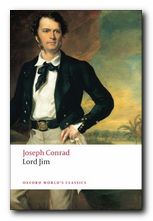 Lord Jim (1900) is the earliest of Conrad’s big and serious novels, and it explores one of his favourite subjects – cowardice and moral redemption. Jim is a ship’s captain who in youthful ignorance commits the worst offence – abandoning his ship. He spends the remainder of his adult life in shameful obscurity in the South Seas, trying to re-build his confidence and his character. What makes the novel fascinating is not only the tragic but redemptive outcome, but the manner in which it is told. The narrator Marlowe recounts the events in a time scheme which shifts between past and present in an amazingly complex manner. This is one of the features which makes Conrad (born in the nineteenth century) considered one of the fathers of twentieth century modernism.
Lord Jim (1900) is the earliest of Conrad’s big and serious novels, and it explores one of his favourite subjects – cowardice and moral redemption. Jim is a ship’s captain who in youthful ignorance commits the worst offence – abandoning his ship. He spends the remainder of his adult life in shameful obscurity in the South Seas, trying to re-build his confidence and his character. What makes the novel fascinating is not only the tragic but redemptive outcome, but the manner in which it is told. The narrator Marlowe recounts the events in a time scheme which shifts between past and present in an amazingly complex manner. This is one of the features which makes Conrad (born in the nineteenth century) considered one of the fathers of twentieth century modernism.
![]() Buy the book from Amazon UK
Buy the book from Amazon UK
![]() Buy the book from Amazon US
Buy the book from Amazon US
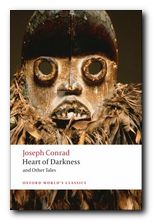 Heart of Darkness (1902) is a tightly controlled novella which has assumed classic status as an account of the process of Imperialism. It documents the search for a mysterious Kurtz, who has ‘gone too far’ in his exploitation of Africans in the ivory trade. The reader is plunged deeper and deeper into the ‘horrors’ of what happened when Europeans invaded the continent. This might well go down in literary history as Conrad’s finest and most insightful achievement, and it is based on his own experiences as a sea captain. This volume also contains ‘An Outpost of Progress’ – the magnificent study in shabby cowardice which prefigures ‘Heart of Darkness’.
Heart of Darkness (1902) is a tightly controlled novella which has assumed classic status as an account of the process of Imperialism. It documents the search for a mysterious Kurtz, who has ‘gone too far’ in his exploitation of Africans in the ivory trade. The reader is plunged deeper and deeper into the ‘horrors’ of what happened when Europeans invaded the continent. This might well go down in literary history as Conrad’s finest and most insightful achievement, and it is based on his own experiences as a sea captain. This volume also contains ‘An Outpost of Progress’ – the magnificent study in shabby cowardice which prefigures ‘Heart of Darkness’.
![]() Buy the book from Amazon UK
Buy the book from Amazon UK
![]() Buy the book from Amazon US
Buy the book from Amazon US
© Roy Johnson 2013
Joseph Conrad web links
Joseph Conrad at Mantex
Biography, tutorials, book reviews, study guides, videos, web links.
Joseph Conrad – his greatest novels and novellas
Brief notes introducing his major works in recommended editions.
Joseph Conrad at Project Gutenberg
A major collection of free eTexts in a variety of formats.
Joseph Conrad at Wikipedia
Biography, major works, literary career, style, politics, and further reading.
Joseph Conrad at the Internet Movie Database
Adaptations for the cinema and television – in various languages. Full details of directors and actors, production notes, box office, trivia, and quizzes.
Works by Joseph Conrad
Large online database of free HTML texts, digital scans, and eText versions of novels, stories, and occasional writings.
The Joseph Conrad Society (UK)
Conradian journal, reviews. and scholarly resources.
The Joseph Conrad Society of America
American-based – recent publications, journal, awards, conferences.
Hyper-Concordance of Conrad’s works
Locate a word or phrase – in the context of the novel or story.
More on Joseph Conrad
Twentieth century literature
Joseph Conrad complete tales
